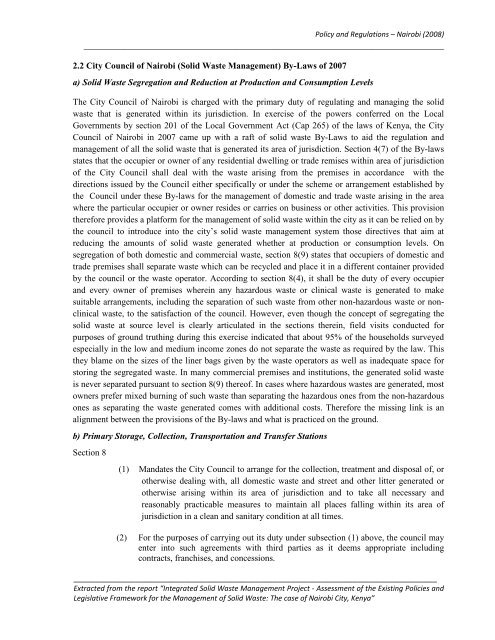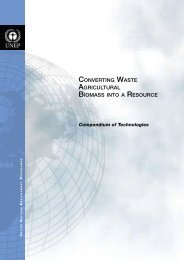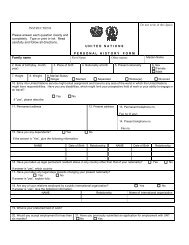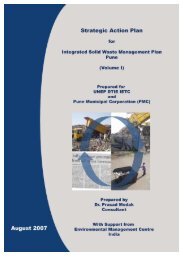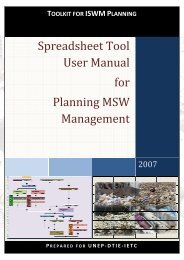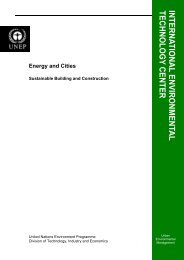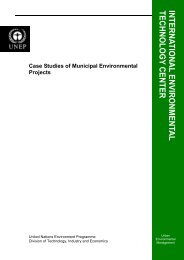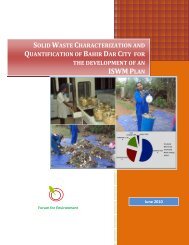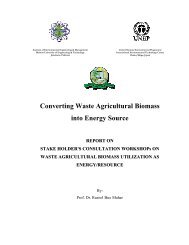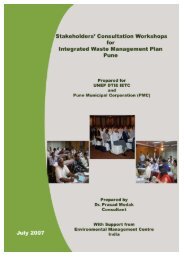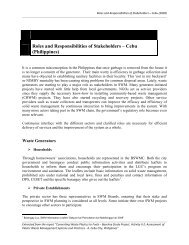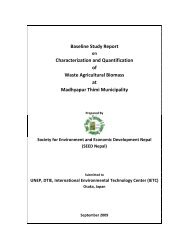Policy and Regulations â Nairobi (Kenya)
Policy and Regulations â Nairobi (Kenya)
Policy and Regulations â Nairobi (Kenya)
You also want an ePaper? Increase the reach of your titles
YUMPU automatically turns print PDFs into web optimized ePapers that Google loves.
<strong>Policy</strong> <strong>and</strong> <strong>Regulations</strong> – <strong>Nairobi</strong> (2008)<br />
_________________________________________________________________________________<br />
2.2 City Council of <strong>Nairobi</strong> (Solid Waste Management) By-Laws of 2007<br />
a) Solid Waste Segregation <strong>and</strong> Reduction at Production <strong>and</strong> Consumption Levels<br />
The City Council of <strong>Nairobi</strong> is charged with the primary duty of regulating <strong>and</strong> managing the solid<br />
waste that is generated within its jurisdiction. In exercise of the powers conferred on the Local<br />
Governments by section 201 of the Local Government Act (Cap 265) of the laws of <strong>Kenya</strong>, the City<br />
Council of <strong>Nairobi</strong> in 2007 came up with a raft of solid waste By-Laws to aid the regulation <strong>and</strong><br />
management of all the solid waste that is generated its area of jurisdiction. Section 4(7) of the By-laws<br />
states that the occupier or owner of any residential dwelling or trade remises within area of jurisdiction<br />
of the City Council shall deal with the waste arising from the premises in accordance with the<br />
directions issued by the Council either specifically or under the scheme or arrangement established by<br />
the Council under these By-laws for the management of domestic <strong>and</strong> trade waste arising in the area<br />
where the particular occupier or owner resides or carries on business or other activities. This provision<br />
therefore provides a platform for the management of solid waste within the city as it can be relied on by<br />
the council to introduce into the city’s solid waste management system those directives that aim at<br />
reducing the amounts of solid waste generated whether at production or consumption levels. On<br />
segregation of both domestic <strong>and</strong> commercial waste, section 8(9) states that occupiers of domestic <strong>and</strong><br />
trade premises shall separate waste which can be recycled <strong>and</strong> place it in a different container provided<br />
by the council or the waste operator. According to section 8(4), it shall be the duty of every occupier<br />
<strong>and</strong> every owner of premises wherein any hazardous waste or clinical waste is generated to make<br />
suitable arrangements, including the separation of such waste from other non-hazardous waste or nonclinical<br />
waste, to the satisfaction of the council. However, even though the concept of segregating the<br />
solid waste at source level is clearly articulated in the sections therein, field visits conducted for<br />
purposes of ground truthing during this exercise indicated that about 95% of the households surveyed<br />
especially in the low <strong>and</strong> medium income zones do not separate the waste as required by the law. This<br />
they blame on the sizes of the liner bags given by the waste operators as well as inadequate space for<br />
storing the segregated waste. In many commercial premises <strong>and</strong> institutions, the generated solid waste<br />
is never separated pursuant to section 8(9) thereof. In cases where hazardous wastes are generated, most<br />
owners prefer mixed burning of such waste than separating the hazardous ones from the non-hazardous<br />
ones as separating the waste generated comes with additional costs. Therefore the missing link is an<br />
alignment between the provisions of the By-laws <strong>and</strong> what is practiced on the ground.<br />
b) Primary Storage, Collection, Transportation <strong>and</strong> Transfer Stations<br />
Section 8<br />
(1) M<strong>and</strong>ates the City Council to arrange for the collection, treatment <strong>and</strong> disposal of, or<br />
otherwise dealing with, all domestic waste <strong>and</strong> street <strong>and</strong> other litter generated or<br />
otherwise arising within its area of jurisdiction <strong>and</strong> to take all necessary <strong>and</strong><br />
reasonably practicable measures to maintain all places falling within its area of<br />
jurisdiction in a clean <strong>and</strong> sanitary condition at all times.<br />
(2) For the purposes of carrying out its duty under subsection (1) above, the council may<br />
enter into such agreements with third parties as it deems appropriate including<br />
contracts, franchises, <strong>and</strong> concessions.<br />
__________________________________________________________________________________<br />
Extracted from the report “Integrated Solid Waste Management Project - Assessment of the Existing Policies <strong>and</strong><br />
Legislative Framework for the Management of Solid Waste: The case of <strong>Nairobi</strong> City, <strong>Kenya</strong>”


